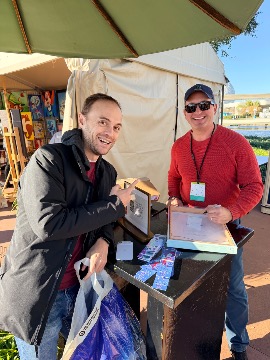Are Apple Vision personas… people?
This is some real snake-eating-its-own-tail shit by Apple Photos. What the hell am I supposed to click in order to not screw up its training of Aaron's face?


This is some real snake-eating-its-own-tail shit by Apple Photos. What the hell am I supposed to click in order to not screw up its training of Aaron's face?
I've hated the culture of asynchronous code review for years, especially as the popularity of GitHub and its pull request workflow lent itself to slow, uninformed, low-empathy, bureaucratic workflows to address problems that would be better solved by higher-bandwidth collaboration between team members.
That said, as someone who's spent the last 9 months building an app by myself, I've really enjoyed having GPT 4o as my "pair". It's still too slow: I get bored and tab away to check Mail or Messages. But instead of waiting hours for feedback I'm waiting for literal seconds. There's also zero ego, politics, or posturing. And while it does hallucinate bullshit, there's far less of it than one can expect from bleary-eyed developers squinting at the GitHub web UI looking for a way to score points. And yes, I have to correct its corrections sometimes, but it almost always catches minor oversights that I (and my linter) would have missed.
TIRED: Spicy autocomplete in your IDE
WIRED: This shortcut that pipes git diff to the ChatGPT Mac app and asks it to critique the code like Justin Searls would
Give it a try. It's another reason that I, for one, welcome our LLM underlords.
I guarantee a non-zero number of people have put their iPhone PIN on their AirPods case.
Starting from scratch with my RSS subscriptions.
Only rules for each feed:
Anything you'd recommend? Let me have it: justin@searls.co
Extremely proud of… how much my posture has apparently improved since I started speaking.
It was a real journey.
If you're experiencing persistent issues caused by the People & Pets metadata in iCloud Photos, there is a hidden way to reset it across all devices associated with your account.
The most common reasons you might want to do this:
The reset function is not currently available from any settings screen, and is only triggered by selecting and removing all people and pets in a single remove operation. I only tested this on a Mac (under macOS 15.0 Sequoia), but it may also work on iPhone and iPad. Since it will trigger a full re-scan of your photo library, it made the most sense to trigger the reset on a Mac that has the full library downloaded locally.
Steps, in a nutshell:
Command-A or by clicking the first and then shift-clicking the last)Subsequently, an indeterminate progress bar was displayed for five minutes or so in my case (I have about 160,000 photos and 50,000 videos). Following that, you should see the "Finding People…" status view appear on the People & Pets tab of each of your devices.
Hopefully this fixes whatever ails you! 💜
Update: As promised, the talk is now up! Go check it out if you want.
I meant to be more on top of it than this, but thanks to some day-of turbulence, I failed to do two things before my Rails World talk on Thursday:
Whoops!
Anyway, better late than never. Here are the things I mentioned in the talk:
Of course, most of you reading this weren't in the audience in Toronto and haven't seen the talk. Sit tight, I'm told that Rails World's turnaround time for getting the video online won't be too long. 🤞
There are a bunch of other things about the app's design and architecture that I had to cut for time and which I hope to share in the future, as well as a behind-the-scenes look at how I put together the presentation. Stay tuned!

When I wrote this pull quote even I was surprised by how much Standard Ruby has improved in the last two years railsdeveloper.com/survey/2024/#what-code-quality-tools-do-you-use

100% agree with DHH on Passkeys. I too was bought-in on adopting them for my apps but realized they pose a customer service nightmare and went back to email login world.hey.com/dhh/passwords-have-problems-but-passkeys-have-more-95285df9
This post is also available in Japanese, care of Shozo Hatta
I'm working on a conference talk and there won't be time for me to detail each and every piece of advice I've accrued for each technical topic, so I'm going to dump some of them here and link back to them from the slides.
Today's topic is Active Storage, the Ruby on Rails feature that makes it easy to store user-generated assets like photos and videos in the cloud without clogging up your application or database servers.
Before you do anything, read this absolutely stellar post describing how to get the most out of the feature and avoid its most dangerous foot-guns.
Here goes.

TIL about the treasure trove of design assets that Apple shares. Extremely cool. developer.apple.com/design/resources/
There have now been 20 major versions since the initial release of Breaking Change, but this is one of the less bad ones. It was substantially improved by friend of the show, Eric Doggett, who helped out with mixing!
If you have strong feelings about anything you hear, you know where to stuff those feelings (other than "deep, deep down"): podcast@searls.co.
Spicier-than-usual show notes follow: